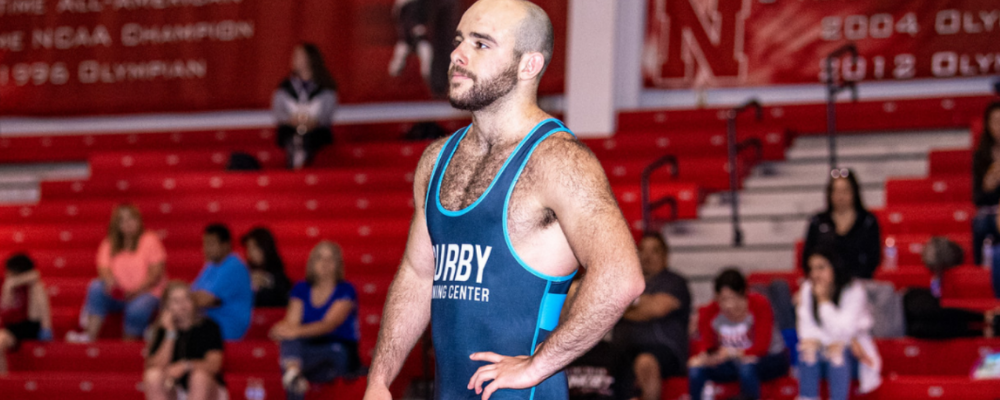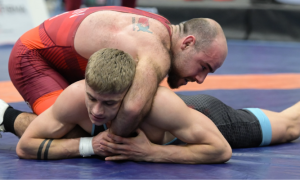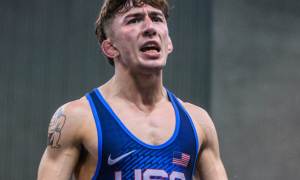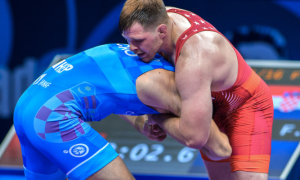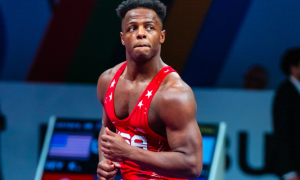Unless the context aligns with career-ending implications, perhaps the worst part about injuries is that they are disruptive. Athletes tend not to sweat the pain so much. Nor do they even mind surgeries or rehabilitation. Rather, it is what all of the above represents: time away from training and competing. If surgery and recovery required no more than a week or two off the mat, as if in some fantasy land, the level of concern would be low, and the topic would not drip with the sensitivity that it so often does.
Injuries are not the problem, no. The loss of time, however, certainly is. We don’t get time back. It is not pro-rated. And when serious, devoted, full-time wrestlers are staring down a prolonged, injury-influenced hiatus, they must — each in their own ways — accept the circumstances. They don’t have to like sitting on the sidelines; but if they can manage to repurpose the time between an injury and their eventual return, then at least the entire ordeal wasn’t in vain.
Then, at least, the disruption has a chance to deliver a net positive. Though you’d be hard-pressed to find a single athlete who would be willing to sign up for such an experience in the first place.
2018 U23 World Team member Lenny Merkin (67 kg, NYAC/NJRTC, 5PM #10) is pragmatically attempting to go with the whole “repurposing” narrative. But to be fair, he had already been down this road before his right shoulder was re-shredded in late-May.
Merkin, who graduated from Princeton and is now seeking his master’s degree in engineering, resides in Brooklyn. When the pandemic initially swept through the nation in ’20, he had to bolt Princeton and return home. The BK is not exactly a hotbed for Greco-Roman, or wrestling in general. And sure, Merkin was able to slap together training sessions in Upstate New York at Curby 3-Style — and he traveled to a few in-country camps, as well. But for a large portion of the prior season-and-a-half, Merkin was doing his letter-best to put his rather big brain to work by coming up with different, creative solutions to train for the Olympic Trials push.
He must have hit on something. After strong showings at both the ’20 Nationals and a month later the U23 domestic championships, he won the Last Chance Olympic Trials Qualifier in March.
The Olympic Trials failed to bear fruit for Merkin but he had little difficulty advancing to the U23 Trial finals shortly thereafter. Which was when his shoulder blew apart.
Facing oft-rival “Mr. Fantastic” Benji Peak (72 kg, Sunkist/NTS, 5PM #2), Merkin’s right shoulder got all sorts of torn-up. It just…happened. Athletes don’t get to choose when the hammer drops. Finals of a Trials, during practice (just as what occurred for Peak in October), the round-of-16 of a tournament… A slip in the shower… The “how” is usually immaterial. What matters is what it means. For Merkin, it meant pressing the pause button just when he had begun staking his claim as a consistent threat on the top circuit.
There has been no wallowing. No complaints, no blame. No excuses, either, for Merkin maintains that he performed a little better against Peak after the re-tear than he did in Match 1 of their series. But there have been some fresh perspectives and lessons learned. Merkin finds himself trying as hard as he can to make the most of this time.
Seems a solid plan. For while time cannot be re-captured, it doesn’t need to be.
So long as it is not wasted.
Lenny Merkin — 67 kg, NYAC/NJRTC
5PM: When did the shoulder first become a serious issue?
It became an issue my first year in college, so in 2015. I had torn my labrum. I avoided getting it fixed and rehabbed it. Every time it started bothering me, I would do rehab for a couple of months and be fine.
But this time at U23’s, after my first finals match with Benji (Peak), I knew immediately after the first throw. I had either posted out wrong or something, but I knew immediately that I had messed something up much worse than it was. Because, I couldn’t move my arm. Right away, I gave up the tech, just gave up those guts. Going into my next match, I told my coaches, “I can’t lift my arm.” Like physically, I couldn’t even lift my arm. They were saying, No, you’re going to be fine. And it was like, Yeah, I’ll grit my teeth and go through it, but still. I actually did wrestle better in my second match with one arm than I had during the first finals match trying to go for stuff.
That first week-and-a-half after I got home, I struggled to do anything normal. I began to do my rehab exercises once the pain had eased up enough. I was doing these rehab exercises for two months and my shoulder just was not getting better like it did the last time. So, I went to see the doctor and he told me that I had a full tear. Plus, he said that my labrum was still messed up from earlier. He didn’t understand how I was able to wrestle with it. He said, “This is the biggest tear I’ve ever seen in someone your age.” I was just like, Well, great — can we fix it? I had already avoided surgery for five years. The Olympic cycle was done.
So in August, they fixed it. Initially, the doctor had told me that I would be out for a year-and-a-half. It is what it is. But when I got out of the surgery, he said it would be a year. Then I went back for my six-week check-in and he said that it might only potentially be six to eight months. Currently, I am trying to play it safe while still working closer to that time-frame.
5PM: What have you been able to do since the injury as well as after surgery?
I’m getting my master’s in engineering from Princeton in one year. I’m still in love with the team. I’m on the team, but acting more like a coach, in a sense. I’m helping out whenever I can. Walking around the mat, learning technique, helping out athletes and trying to learn how to convey the technique properly without putting my hands on them. It is fun for me to kind of develop that skill because then I can think about wrestling in a whole different way.
I’m pursuing a lot of coaching gigs here and there. I’m planning to do some stuff with Joe Uccellini at Curby (3-Style). Coach (Chris) Ayers put a lot of faith in me and asked me to coach his daughter at her first college open. She did really well. Wherever I’m able to help out, I’m trying to do that, while also getting my masters and staying in shape.
I try to keep my body moving. Every day I will do two or three miles or hill sprints, or some other type of cardio. Or, lifting with my other arm. Pretty much anything. I’ve been working very hard to keep my mind right, and in order to do that I need to keep my body right. I’m in phenomenal shape, I think.
For six weeks I couldn’t do anything. I was stuck in a sling for six weeks. I had my surgery August 16th and on September 1st I went to school. I was still in pain, more or less. So I got a couple of extra slings from CVS and started going to spin class in school. I was like, Well, I can bike with one arm; there are motivational coaches and other people are doing it with me who are probably a little less athletic. I did that for two or three weeks, and then at six weeks my sling came off. That was when I started physical therapy, which is learning to move my arm again. It’s crazy, because I had started to do everything with my left arm. I had begun imagining doing a lefty underhook as opposed to hitting my righty underhook. It has been a lot of visualization that I’ve been doing along with the coaching.
5PM: Six months from surgery would put you at February/March. Eight months would mean April, which would be NYAC (Bill Farrell Memorial) in the beginning of that month or the Open towards the end of it. Do you have in your mind a goal regarding your comeback date? Or do you just look at it like, ‘When I’m ready, I’m ready’?
LM: It is kind of mixed. I have a date in mind for when I’d like to come back. I didn’t know about New York, so I thought Vegas (US Open) end of April. I thought that would be safe-ish. Again, it’s not really up to me at this point. It’s up to my shoulder and what it tells me. So, I don’t put any pressure on myself to get back, but I do everything I can day-by-day to speed that up. Or, optimize it.
5PM: I look at 2021 as overall almost a lost year, even though there were athletes who were able to get in a fair share of matches. I’d lump you in that group. It has been nearly six months since the U23 Trials, so this has already been a sizable break for you. Do you miss competing?
LM: I haven’t thought about it. If I start thinking about it, then I’ll start missing it. Right now, it’s about wanting to come back on a different level than before. I watch all of these international matches and notice the ease in which they don’t get turned in par terre, or the ease in which they turn and lift guys from par terre. I want to be the type of athlete who can do that to anyone. They (foreigners) don’t care who they are wrestling, they’re lifting and throwing them.
So it’s not so much about missing competition. I miss more the opportunity to get better at wrestling. Right now, I’ve been focusing on getting better at everything besides wrestling. Which, is nice. It’s nice to have a break and a little time to yourself to realize what you want both in life and in the sport. But at the same time, I’m looking forward to it more than ever, just to be back. Whether you’re sick or have an injury, it doesn’t mean that you’re done. There is a good chance that you will come back better. We see all of these comeback stories and we’re always amazed, but there is no burn-out. I’m really relaxed mentally and at peace with what happened. I am genuinely happy to walk into the wrestling room every day. Not because I don’t have to grind, but because I’m helping people. And helping people helps me at the same time.
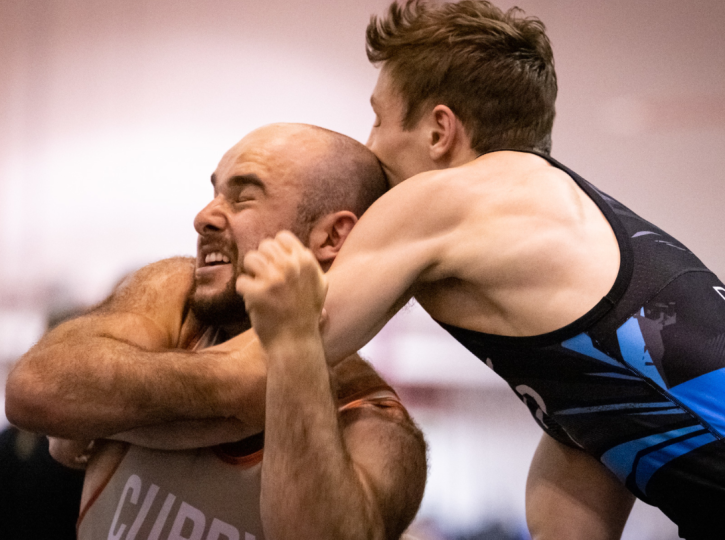
Merkin (left) attempts to arm throw Benji Peak in the finals of the 2021 U23 World Team Trials. (Photo: Mark Lundy)
5PM: When you come back, are you a 67 or 72?
Lenny Merkin: We’ll see. We’ll see what my body says. After the operation I have stayed pretty lean. I also lost a lot of muscle mass in that arm, so I don’t know how my weight is going to be when I get that muscle mass back. I do like being lean, I like being at 67. But sometimes, you have to weigh the pro’s and con’s of being down there. Right now, I don’t want my focus to be the weight this year. I want my focus to be on getting better overall. Competition this year is mainly going to be a test to see if my shoulder holds up. Then whatever happens with that, we’ll do the best we can. It is what it is. I can’t put that much pressure on myself because I have higher goals in mind. I have this next Olympic cycle. That’s my ultimate goal. There are a lot of short-term goals, but that’s the pinnacle. I don’t want to put myself in a compromised position because of that.

Listen to “5PM50: Mr. Fantastic Benji Peak” on Spreaker.
Listen to “5PM49: Robby Smith on coaching, fatherhood and mentors” on Spreaker.
Listen to “5PM48: Austin Morrow and Gary Mayabb” on Spreaker.
SUBSCRIBE TO THE FIVE POINT MOVE PODCAST
iTunes | Stitcher | Spreaker | Google Play Music

Notice: Trying to get property 'term_id' of non-object in /home/fivepointwp/webapps/fivepointwp/wp-content/themes/flex-mag/functions.php on line 999

